Explore nature right in the middle of the city through hands-on learning opportunities for both Elementary and High School students at the Habitat Conservation Area.
Elementary School Programming
Seasonal programs
Choose one of our most popular programs and we can adapt it to the desired grade. Our 1 to 2 hour long programs are bound to spark students' passion for nature. Customized programs also available.
Spring into the Wetlands
Learn all about plant and animal adaptions to the seasonal transition from Winter to Spring. Witness the Habitat Conservation Area waking up and sprouting to life in a scavenger hunt, watch for birds returning to or passing through on their migratory journey, and learn about their migratory obstacles. Explore the exciting world of seeds and help the grassland habitat diversify through the making and release of seed bombs.
Plant Life
Take a closer look at plants, large and small, in the grassland, forest or wetland habitats. Learn about the parts of the plant, their function and the special adaptions they have to their surroundings through plant surveys and creating your own plant activities. Dive into different types of seeds, seed dispersal methods and make seed paper to take home and plant in your garden.
Wetland Worth
Explore the wetland habitat and learn about the importance of a wetland. Learn about the different types of wetlands and conduct a mini riparian assessment through scavenger hunts, plant surveys, and pond dipping. Dive into the beauty of wetlands and what species call this urban wetland home.
Discover Fall
Dive into the fall season, discussing seasonal changes, the causes for these changes, and how this impacts the vegetation. Learn about migration, hibernation, and other animal adaptations to the seasonal transition through obstacle courses, scavenger hunts and seed collections.
Winter Adaptations
Everything is quiet, the ground is covered in snow and ice, and there isn’t much living in the winter, right? Wrong! Learn all about the animals surviving the frigid temperatures and explore the activity below the snow layer. Study what makes snowflakes unique and how animals use snow to their advantage.
Animal Tracking
Understand predators, prey, and their relationship with each other. Learn about local predators and prey, browse, and more than you ever imagined you would learn about scat. Try your hand at orienteering while we learn about animal tracking and the movement patterns prey use to evade their predators.
Winter Outdoor Survival Skills
Challenge yourself by building shelters, testing your orienteering skills, and learning about basic fire building principles. Learn about winter animal survival skills and utilize those skills to survive the winter elements by yourself!
Design Your Own Program
Our Ecologist will customize a program that aligns with your curriculum links and teaching goals. To start, select one or two of our most popular activities and we will do the rest.
- Pond Dipping
- Insect Survey
- Bird Survey
- Plant Survey
- Make Seed Paper/Seed Bomb
- Seine Netting
- Habitat Assessment
- Interconnectivity Web
High School Programming
Time to take the education to the field with our new 'A Day in the Life of an Ecologist' program offered for grades 9 to 12. These four new programs will take place in Wascana's Habitat Conservation Area where students will be able to supplement their classroom learning with hands-on field experience in areas such as aquatic, plant, wetland and biodiversity surveys. Whether your students are using a seine net to assess the population diversity in the marsh or conducting a riparian assessment, they are bound to have a blast! Programs are 2 to 3 hours long.
Aquatic Survey
Conduct a fish population diversity survey using seine and gill nets to take samples from the marsh. Learn about the different fish species found in Wascana Lake, perform dissection assessments, fish ID and so much more.
Plant Survey
Learn all about invasive and native prairie plants by conducting a quadrat plant survey and identifying plants, cattail planting, tour the greenhouse, learn about propogation, do some seeding/planting/harvesting seeds, and more.
Wetland Survey
Take a closer look at our wetland while conductinga riparian assessment and water quality test. Investigate the small aquatic invertebrates under a microscopic lens while pond dipping and even do some fish species surveying.
Biodiversity Survey
Assess the biodiversity of the marsh through birding, nest surveys, insect netting, plant ID, animal tracking, pond dipping and more.
Field trips and interpretive programing only costs $2/student!
To book a field trip or interpretive program contact Wascana Ecologist Conner Baragar at conner.baragar@gov.sk.ca or (306) 531-8511



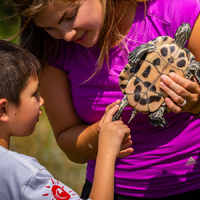
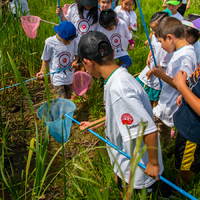
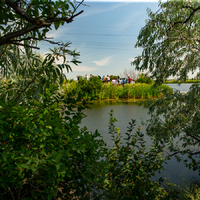
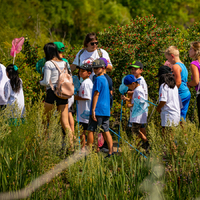
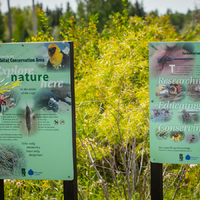
with our newsletter